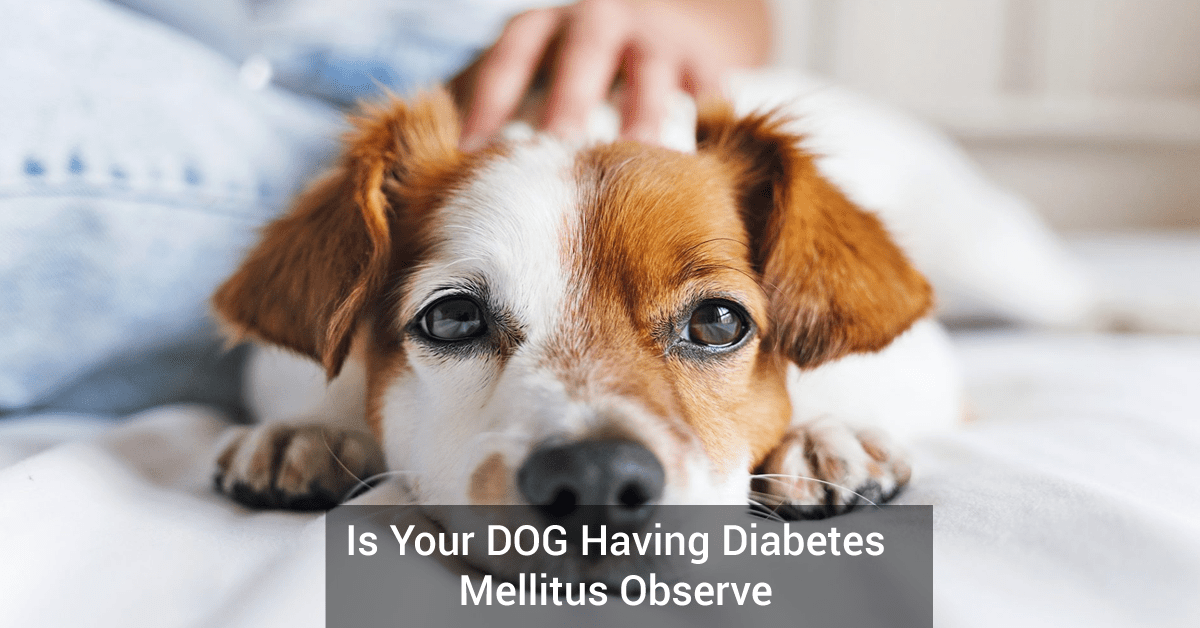This blog will give you complete information about Diabetes Mellitus in Dogs. How you can suspect them of being suffering from it, prevent them to become its victim and management of the condition to provide healthy as well as
happy lives to your loving Pet Dogs.
What is Diabetes Mellitus and do dogs too suffer from it ?
Firstly the answer to the question that do Dogs suffer from Diabetes Mellitus is ‘YES’ same as humans, DOG can also suffer from Diabetes Mellitus. Diabetes is of 2 types Diabetes mellitus & Diabetes insipidus but as this blog is limited to
Diabetes Mellitus when we say Diabetes here it means former one. Thus Diabetes is a metabolic condition in which cells of the body of your Dog is unable to utilize the end product (glucose) formed after digestion of carbohydrates. Thus increasing level of glucose in blood and causing
concurrent problems.
What is the relationship of Insulin to Diabetes Mellitus ?
Insulin is a hormone produced by Pancreas a organ present in abdomen of your Dog. This hormone is ultimately responsible for utilization of glucose by cells of body. Thus any hindrance in functioning of this hormones lead to Diabetes Mellitus. On basis of this fact Diabetes Mellitus is of two types-
i) Insulin dependent Diabetes Mellitus (IDDM) – here there is inability of Pancreas to produce sufficient quantity of Insulin also known as Insulin-deficient Diabetes Mellitus.
ii) Non Insulin dependent Diabetes Mellitus (NIDDM)- here the cells of body become resistant to action of insulin thus even if the level of insulin is adequate our body cells cannot utilize glucose also called insulin-
resistant Diabetes Mellitus.
What Causes Diabetes in Dogs?
Factors in multitude are responsible for causing diabetes in Dogs. Some of the important one are-
i) Genetic factors – certain breeds of dogs like Samoyeds, Pugs, Miniature poodles, Golden Retrievers, Labrador Retrievers, Pomeranians, Terriers are more susceptible of having Diabetes.
ii) Age factor- More common in middle aged to advanced aged dogs of range 4-14 years however peak incidence is seen at age of 7-9 years.
iii) Obesity- It is one of most common reason of development of Insulin-resistant type Diabetes mellitus.
iv) Diet- This is most commonly asked questions of dog owners that what type of diet influences diabetes occurrence. So diet of your dog is not directly related to development of diabetes but once developed necessary checks are required in diet to manage the condition.
Though diets that contain high fat amounts can cause Pancreatitis & thus can aid in development of diabetes. Further obese dogs fed with high calorie diet are always at greater risk. Also adult dogs never need much carbohydrate in their diet thus must be fed with least carbs containing diet. With frequency of feeding lessened once in a day in adult dog.
Thus dogs that are fed with high fat diets and carbs that are not at all required become obese and which may be a contributing factor in development of Diabetes.
v) Recurrent Pancreatitis- Pancreatitis is a condition in which function of pancreas is hampered due to its inflammation pertaining to any disease condition or obesity related reasons.
vi) Spaying status- It is seen that intact female dogs have higher chances to develop the condition then the spayed female dogs.
vii) Other reasons- due to medication that include steroid therapy, Cushing’s disease that raises that blood sugar levels.
What are the symptoms that indicate your Dog being Diabetic?
i) Polyphagia- increased appetite means the dog will eat more and it’s appetite will not be satiable.
ii) Polydipsia- increased thirst.
iii) Polyuria- increased urination.
iv) Unexplained weight loss in long run.
v) Cataract or cloudy eyes in which vision of your Dog becomes affected.
vi) Inability of wounds to heal
vii) Recurrent skin infections
viii) Weakness
‘Increased appetite, thirst & urination may be the first symptoms that must alert a dog owner for suspecting diabetes in dogs’
How detrimental is Diabetes for Dog’s life?
Though diabetes is an incurable disorder but if managed properly the dogs can live long and happy lives. But in case when the condition remains unnoticed, undiagnosed or not properly addressed by pet parents it can have several side
effects on health of your like-
i) Complete blindness
ii) Susceptibility to infectious Diseases
iii) Skin affections
iv) Kidney failure
v) Life threatening condition-Diabetic-ketoacidosis may also occur.
How can we come to confirmatory Diagnosis of Diabetes Mellitus?
For confirmatory diagnosis one must necessarily contact to a Veterinary doctor which can prescribe certain tests like Random blood sugar profiling or Pre & Post Prandial blood sugar profiling. HbA1c tests can be undertaken but always after counsel to a Vet.
Are there ways to keep the diabetic dog healthy?
Matter of ease is that Diabetes mellitus though incurable but if managed properly can ensure normal healthy lives to dogs. Following points must be known to a pet parent in order to manage a diabetic dog-
i) Insulin therapy- Veterinarian can prescribe your Dog with proper dose and regimen of insulin. Insulin shots must be injected with due care of blood sugar levels and as prescribed by your doctor.
ii) Oral Hypoglycemic Medicines- Your doctor can also suggest some medicines that can be given orally to dogs to control their bloodsugar levels.
iii) Exercise- it is one most important aspect and regular exercise to your dog can help him in maintaining normal blood glucose levels.
iv) Diet- Most important among all and following dietary
precautions must be taken-
✓ Diet is always variable for each individual dog there is no ‘one diet fits all’ concept thus should be formulated seeing body condition score (obese, under-weight or normal-weight) and metabolic needs.
✓ High fibre-low fat is thumb rule for suggesting diet of a diabetic dog. With this adequate requirements of water must be fulfilled.
✓ Diet must be divided in parts and must be given at multiple times a day to control glucose surge in blood and also to meet satiatory requirements.
✓ Timely feeding is the hallmark in feeding a Diabetic dog especially when on insulin thus frequency of offering food must be in concordance to insulin shots and must be as directed by Veterinarian.
✓ Certain therapeutic diets are available in market which can be incorporated in diet of dogs.
✓ Calorie intake must be strictly according to body condition of dog. Generalizing the low calorie intake in all Diabetic dogs is incorrect. Complex carbohydrate containing diet is always suggested. But it must be clearly understood that adult dogs never have nutritional requirement of carbohydrates in their diet.
✓ Always watch the sugar content while buying pet foods as some of them contain high amount of sugar which can be detrimental to your Diabetic dog.
At what time we must fed a adult diabetic dog which is on insulin therapy?
i) When prescribed one shot of Insulin- One must offer 2/3rd of total daily allowance to a dog in morning before injecting Insulin and second feeding should be done with remaining 1/3rd allowance after 8-10 hours in evening.
ii) When prescribed two shots of Insulin- One must offer half of dietary allowance before first shot in morning and rest half after 8-10 hours before second shot of Insulin in evening.
What is life expectancy of a Diabetic Dog ?
Expectancy of life of a dog having other parameters of body normal that includes most importantly liver and kidney parameters, if kept under proper medical supervision may have normal life expectancy. However time of diagnosis of the condition, its duration, stage, damage done to body before diagnosis and medication/managemental interventions offered can have effect on life expectancy.
Therefore pet owners must be well informed about sign and symptoms of Diabetes so that it can be diagnosed timely and proper steps can be taken to safeguard health of a dog.
What precautions are required when you are parent of a Diabetic Dog ?
i) Always monitor glucose level before injecting Insulin and if monitoring facility is not available you can offer food to your dog prior to insulin shots to check whether it’s normal or not.
ii) Always keep a source of sugar that is readily absorbed in stomach while injecting Insulin in order to address abrupt and excessive fall of blood glucose that could otherwise have fatal consequences.
iii) Mark you dog’s collar as diabetic so as to avoid people that may offer treats which may contain high amount of sugar.
iv) Routine monthly checkup with blood glucose profiling is always recommended.
v) Diet formulated must be strictly according to needs of a dog. Though it’s necessary to restrict calories in diet of a dog but we must remember the concept of adequate weight. Obese dog must given diet with less calories while a under weighing dog can be given some better calorie allowances to have weight gain.
Management of pet dogs indeed counts a lot. Whether it is nutrition, housing or health pet parents must be well aware of all spheres of well being of their loving Pets. When we discuss Diabetes mellitus it is one of the problem very
commonly reported these days in dogs that are offered diets which are offcourse higher in nutrients as what actually required and also when these dogs have very less physical activity.
Likely to humans it is also suggested for dogs that proper dietary plan as well as physical activity like exercise or any outdoor recreation activity may prevent not only Diabetes but a long array of diseases to develop / progress. Hope this blog will necessarily enlighten you regarding all what you need to know if your furry-buddy is diabetic or you suspect him for same. Wishing a tight bond between you and your adoring Pet dog moon and back.



